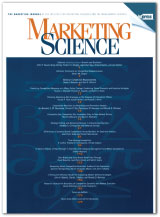Academic articles
Practitioner articles
Working papers
Books
Book chapters
Case studies
Other publications
Subject(s)
Marketing
Keyword(s)
production differentiation, marketing strategy, consumer behavior, pricing, cost of thinking, entry decision, consumer empowerment
Consumers aware of a new benefit will often experience uncertainty about its personal relevance or usage value. This paper shows that the decision to deliberate further to resolve this uncertainty and reach a polarized judgment of personal relevance critically depends on the posted price. In particular, a price above the consumer's initial willingness to pay might be thought provoking and enhance the perception of relevance with a certain probability. This behavioral mechanism is introduced formally and by way of an experiment with reference to the purchase of organic lettuce and fair-trade coffee. Accounting for the effect of price as a stimulus to think, a monopolistic firm should either over price ("transgressive pricing") or under price ("regressive pricing") in comparison to the consumer's willingness to pay. Under certain circumstances, the firm should also empower consumers with means that reduce the effort of deliberation.
© 2007 INFORMS
Volume
26
Journal Pages
118–129
Subject(s)
Product and operations management
Keyword(s)
manufacturing strategy, supply chain, new product development, innovation
Volume
2
Journal Pages
1–20
Subject(s)
Marketing
Keyword(s)
Befragung, Virtuelle Informationsbörse, Entscheidungsproblem, Prognose, Wissen, Informationsmarkt, Informationssammlung
Volume
60
Journal Pages
321–334
Subject(s)
Economics, politics and business environment
Keyword(s)
competition policy, effects-based approach, antitrust, state aids, mergers
Volume
29
Journal Pages
281–304
Subject(s)
Economics, politics and business environment
Keyword(s)
competition policy
This paper allows for endogenous costs in the estimation of price cost margins. In particular, we estimate price-cost margins when firms bargain over wages. We extent the standard two-equation set-up (demand and first-order condition in the product market) to include a third equation, which is derived from bargaining over wages. In this way, price-cost margins are determined by wages and vice versa. We implement the model using data for eight European airlines from 1976-1994, and show that the treatment of endogenous costs has important implications for the measurement of price-cost margins and the assessment of market power. Our main result is that observed prices in Europe are virtually identical to monopoly prices, even though observed margins are consistent with Nash behavior. Apparently, costs had been inflated to the point that the European consumers were faced with a de facto monopoly prices.
© Blackwell Publishing Ltd. 2006
Volume
54
Journal Pages
351–368
Subject(s)
Strategy and general management
Keyword(s)
competitive strategy, competitive advantage, madonna, customer analysis
Looking outside the confines of the usual business sphere, we find that Madonna is a born entrepreneur.Jamie Anderson and Martin Kupp reveal the business side of an entertainment legend.
© 2006 The Author Journal compilation © 2006 London Business School
Volume
17
Journal Pages
26–31
Subject(s)
Technology, R&D management
Keyword(s)
Brazil, telecommunications
Purpose - This article seeks to discuss LUZ, a Brazilian energy supplier that has decided to use their network for telecommunication. Design/methodology/approach - This case describes the acquisition-process from the perspective of the ESCRA sales manager, whose actions are analyzed, evaluated and discussed in class. Findings - LUZ, a Brazilian energy supplier, has decided to use their network for telecommunication. They found a subsidiary named LUZATEL for purchasing the required IT equipment. Four IT companies make it to the short list. One of them is ESCRA. ESCRA is a large Swedish producer of telecommunication equipment, who has recently started to additionally offer IT solutions. Originality/value - This paper uses a Brazilian energy supplier as a case study.
With permission of Emerald
Volume
21
Journal Pages
189–194
Subject(s)
Economics, politics and business environment
Keyword(s)
growth, infrastructure, political economy, lobbying, France
JEL Code(s)
D72, D78, O40
This paper proposes a simultaneous-equation approach to the estimation of the contribution of transport infrastructure accumulation to regional growth. We model explicitly the political-economy process driving infrastructure investments; in doing so, we eliminate a potential source of bias in production-function estimates and generate testable hypotheses on the forces that shape infrastructure policy. Our empirical findings on a panel of France's regions over 1985-92 suggest that electoral concerns and influence activities were, indeed, significant determinants of the cross-regional allocation of transportation infrastructure investments. By contrast, we find little evidence of concern for the maximization of economic returns to infrastructure spending, even after controlling for pork-barrel.
With permission of Elsevier
Volume
90
Journal Pages
1133–1153
Subject(s)
Economics, politics and business environment
Keyword(s)
regulation, merger policy, state aid and anti-trust
Over the last decade, sector-specific regulation has been used to promote competition in European network industries. Given that competition is still rudimentary in some sectors, this process is still not finished. As a result, Member States have continued to remove regulatory barriers in network industries. This paper discusses the experiences from the energy, telecommunications and transport sectors by focussing on the role of European competition policy. We review a number of important case decisions in merger control, anti-trust and state aid control and discuss their implications for market opening. We conclude that a more holistic approach is needed in order to increase the effectiveness of competition policy instruments, i.e. a closer co-ordination of competition instruments, in particular state aid and anti-trust/merger policy.
© Verein für Socialpolitik und Blackwell Publishing Ltd. 2006
Volume
7
Journal Pages
355–372
Subject(s)
Human resources management/organizational behavior
Keyword(s)
60-degree instrument, human development, life cycle, motivational need systems, psychodynamic approach, personality assessment, executive functioning, inner theatre
Volume
17
Journal Pages
898–917


